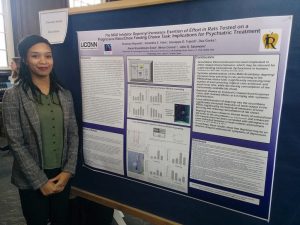Understanding the Role of SR-B1 in Lipid Metabolism and Inflammation
Summer 2016
Investigators: Christopher Blesso, Christina Jiang
SR-B1 is an HDL receptor that has a role in cholesterol exchange and the initiation of intracellular signaling cascades involved in lipid metabolism. SR-B1 is highly expressed in the liver, but its function has not been fully determined in adipocytes, which is the aim of this project. Cholesterol imbalance can result in disease states such as atherosclerosis, so the study of this HDL receptor can be implicated in disease prevention.
The aim of the research was to perform successful knockdown in 3T3-L1 adipocytes by using siRNA (scramble, cyclophilin, SR-B1); determine gene expression of SR-B1 and cyclophilin to confirm knockdown; determine inflammatory response of adipose by introducing LPS or macrophage-conditioned media to cells. After treating the cells with the appropriate reagents, RNA was isolated, cDNA was synthesized, and PCR was conducted to confirm knockdown. There was a 40% knockdown in cyclophilin when treated with cyclophilin siRNA and insignificant knockdown with SR-B1 knockdown. There is about a 60-70% knockdown of SR-B1 in adipocytes treated with SR-B1 siRNA, indicating that the knockdown was successful. In the presence of macrophages, there is about a 40% knockdown of SR-B1. In the presence of LPS, there is also about a 40% knockdown of SR-B1. These successful gene knockdowns provide evidence to continue on with the experiment.
